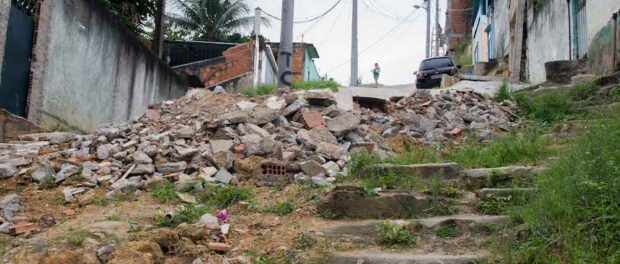
For the original article in Portuguese by Marcella Melo published in Voz das Comunidades click here.
After years requesting improvements to Horácio Piccorelli Road, residents have decided to fund the work out of their own pockets and to do the work themselves.
The first sight of one of the streets of Morro do Adeus in Complexo do Alemão is of a steep rise with a rift in the middle. This is Horácio Piccorelli. In this rift there are a lot of debris, but less than before. It’s already possible to see improvements to the pavement residents decided to build, as they could no longer stand not being able to climb to their homes safely.
“The idea of making the pavement on the road themselves came out of necessity for all the residents. We need to be able to go up to our doors easily, and also for cars to be able to go up. There were holes everywhere here, nobody could walk properly. For the elderly, it was even worse. So residents got together, each one helping however they could. Some gave cement, others gave money; husbands, sons and all the men are helping with the labor and we are building,” said Lucinéia Veiga, 55, a resident of Complexo do Alemão for 50 years.
Ana da Silva, 60, remembers what the street’s condition was like before construction started: “Previously, getting up to our homes was difficult. For this reason, we are building a slope. We don’t want stairs, as the risk of falling is much higher for the residents. When the slope is finished, things will become much easier, even wheelchairs will be able to go up. Down below, for example, there is a blind man: it is going to be much easier for him too. Apart from all that, it is far simpler to build a slope.”
Currently, around 15 residents are engaged in the task of building this sloped paving. Aside from the holes and debris that are still there, weeds are also present. In addition, any rain brings the arrival of many bugs, mainly snails which are powerful transmitters of diseases, which is yet another concern for the residents of the street.
Construction started last year and, according to the residents, every weekend is dedicated to building. Sometimes even the evenings during the week are used to keep the work going.
“We looked for help in various places, including the Neighborhood Association. However, they claimed that our street is not part of Morro do Adeus. But how can it not be part? When they want votes for the president of the association, they think that we are a part of it, knocking on our doors. The association is not helping at all,” Lucinéia protested indignantly. Ana went on to say:
“The City government even came here and wanted to stop construction. They gave various excuses for not providing the service. The Association turned us away, saying that we are not part of Adeus. But if nobody does anything, we can’t sit around waiting, can we? We are carrying on with construction. People used to be nervous to climb up the road. Today, we are changing the situation.”
Another resident to give his statement is Marco Antônio de Souza, 42:
“We got together, gave cement and sand, and we are doing it. We were tired of hearing empty promises. The street was always like this, so we decided to get together and make a change. We did not receive help, not even to weed. Those who have cars had to park at the bottom and walk up. There were mud, holes and weeds on every side. I have lived here since I was born and if as residents we didn’t do it, nothing was going to change. Our goal is to be able to get the street together and finish the construction,” he said.
We looked for the president of the Morro do Adeus Neighborhood Association, but she was not to be found. This is not the first, second or even third time that residents have gotten together to make improvements that should be done by the State. Feelings of powerlessness and abandonment, which the favela already knows well, have re-surfaced and it became necessary to do everything alone. In order for the construction to be fully completed, residents are asking for help and attention through this article published by the community newspaper Voz das Comunidades.

